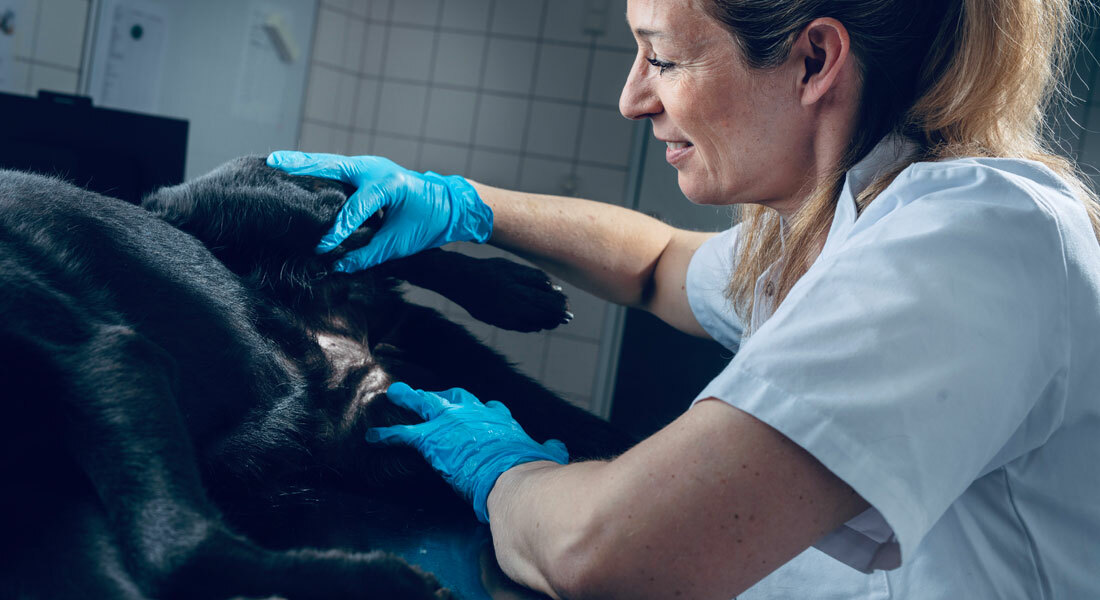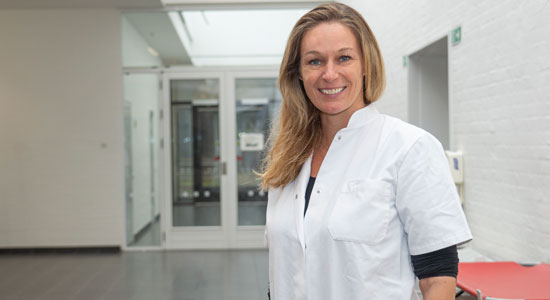Click here to read the curriculum in the course catalogue.
Course code: SCAM25047U
Diagnostic Clinical Dermatology
This course is a part of

The purpose of this course is to further develop the participant’s basic diagnostic platform within clinical dermatology to include more sophisticated diagnostic thinking, competences and skills, which are required to approach and successfully diagnose the dermatological patient.
The participant should, at an advanced level, be able to combine knowledge collected from basic and advanced paraclinical tests with clinical findings.
The course will provide knowledge on cytological interpretation of skin lesions, thorough assessment of cultures and sensitivity testing, IgE serum test- and intra-dermal test assessment, CT and video otoscopic evaluation of the ear canal and basic description and interpretation of dermatohistopathology.
Dermatological patient cases and clinical work-up results will be used in an interactive dialogue with the participants in order to expand their competences in a problem-based patient approach of the dermatologic patient.
Read more about the specialisation tracks and the Master's programme on the main page:
Course Directors on Diagnostic Clinical Dermatology

Mette SchjærfAssociate Professor |
Course details on Diagnostic Clinical Dermatology
Dates and examination
Course dates 2026
13-17 April 2026
Course dates 2028
18-22 April 2028*
*Tuesday-Saturday due to national holiday
The course is available every second year.
Examination
Please find dates and details about the exam in the exam schedule.
Learning outcomes
Knowledge
Having completed the course, the student must be able to:
- Define, identify and discuss veterinary methodology and paraclinical tools in systematised reflective clinical decision making in companion animal clinical practice area of clinical dermatology.
- Explain, reflect about and demonstrate overview of complex clinical decision-making, patient therapy and management at an advanced specialised level.
- Explain, reflect about and demonstrate overview of systematic clinical and diagnostic approach to the dermatological patient at an advanced level.
- List, classify, and demonstrate critical reflection on existing and new approaches to patient diagnosis, therapy, management and client education within clinical dermatology in an advanced practice situation.
Skills
Within the area of clinical dermatology, the graduate must be able to:
- Apply the quantitative and qualitative methodologies such as performing and applying clinical diagnostic thinking as well as master relevant practical diagnostic skills for companion animal dermatology.
- Interpret, assess and reflect on collected patient data combined with assessment of clinical lesion morphology in order to identify the nature and causes of the dermatological disease.
- Make clinical decisions, arrive at a diagnosis and consider evidence-based scientific approaches in order to plan and administer further appropriate diagnostics, patient therapy and management for the dermatological patient.
- Collect and interpret skin cytology, hair and scraping samples and correctly identify appropriate diagnostic plan and follow-up based on initial basic skin sampling of the dermatological patient. Understand the interpretation of basic histopathology from common skin lesions. Demonstrate critical reflection of pros and cons for intradermal- and serum IgE-specific tests. Interpret CT data of the ears (external canals and middle ear) of the dermal-otologic patient and master video-otoscopic performance and critical assessment for the chronic otitis patient.
- Continuously seek out, reflect on and apply new evidence-based methods and solution models.
- Communicate and discuss academic issues and solution models with both peers and non-specialists at an advanced level and across disciplines within companion animal practice.
- Communicate effectively in writing and pass on results to relevant parties
Competences
Following the course, the candidate must be able to:
- At an advanced level assess differential diagnosis for companion animal dermatological diseases and critically evaluate the relevant diagnostic approaches to reach a dermatological diagnosis.
- Educate owners of patients with acute and chronic dermatological disorders with respect to diagnostic approach, prognosis and long-term medical treatment when applicable.
- Work independently, take responsibility for, predict, prognosticate and make decisions within clinical dermatology at an advanced basic level.
- Independently evaluate and structure own learning processes and continuously obtain new knowledge at an advanced level within clinical dermatology.
- Use relevant scientific literature in the field.
- Evaluate different patient types, including the assessment of dermatological lesions in the dog versus the cat, combining the above-achieved skills.
Admission criteria
You must meet the following criteria to be admitted to this course:
- Hold a degree in Veterinary Medicine
- Hold one of the following certifications
- DVA Certificate in Small Animal Diseases (equivalent to the 4 compulsory courses of the Master of Companion Animal Clinical Science)
- Swedish / Norwegian / Finnish specialist in diseases of dogs and cats
- Equivalent competences
- Have a minimum of 2 years of relevant work experience from companion animal practice
- Be proficient in English
Find detailed information about the formal requirements for this course.
Read more about admission on the main page of Master of Companion Animal Clinical Science.
Tuition fees
EU/EEA citizens*
Single course student: 36,500 DKK
Master student: 33,000 DKK
Non-EU/EEA citizens
Single course student: 40,740 DKK
Master student: 37,240 DKK
Tuition fees include course materials and lunch/coffee. Books are not included in the tuition fees and must be purchased by the participants.
*Citizens of the EU, EEA or Switzerland is entitled to a subsidised tuition fee, due to EU legislation, hence the difference in price.
Location
University of Copenhagen
University Hospital for Companion Animals
Dyrlægevej 16
1958 Frederiksberg
Denmark
Contact
Christine Gulstad
Study Administration Officer
lifelonglearning@adm.ku.dk
Tlf: +45 35 32 12 73
